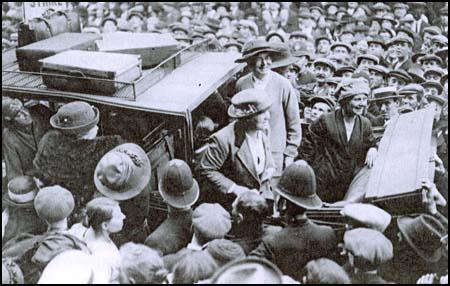Before WWI, most Poplar councillors were drawn from Poplar’s small middle class, were Conservative or Independent, or were even openly sponsored by large local firms. It was not unusual for councillors to have a registered business address in Poplar, but live somewhere else in London.
This, historically, was the nature of local authorities; from the early 19th century Boards of Guardians, through District Boards of Works, to the Metropolitan Borough Councils created in 1900. These were patriarchal and well-to-do administrators rather than genuine representatives of local people. Even though Poplar was one of the poorest boroughs in the country, the Labour party and other reformers were not trusted to be able to properly manage the council or were frequently seen as troublemakers threatening the established order
So, when Poplar Labour Party – led by George Lansbury – won control of Poplar Borough Council in 1919, they were just as surprised as everyone else. When George Lansbury was elected as Mayor Poplar during the council’s first meeting, he said:
I thought I should always be in opposition and fighting a forlorn hope. But something like a miracle has happened, and here I am!
In the following couple of years, the council made a number significant social reforms, aimed at alleviating unemployment, hunger and poverty. However, the still-applicable Poor Law of 1834 demanded that borough councils fund their own local poor relief; there was no national government financial support. This meant that unemployment benefits and similar had to be paid for out of the rates, and any plans to increase relief meant raising the rates. Also, council income at the time was based on a ‘rateable value’ deriving from rents. Because Poplar was such a poor borough, property rents were low.
This was a ‘double whammy’ (to use modern parlance) for Poplar: less than average rent-based income and higher than average poverty-related outgoings. As a consequence, long before the election of a Labour-run council, Poplar had to charge higher rates to its residents than other boroughs. In 1906, for example, Poplar Borough Council’s combined rates were 11s 8d in the pound, the highest in London, and twice as high as in Kensington. Clearly, the system was unfair.
In addition to local rates collection, borough councils were also expected to collect a so-called ‘precept’ for the funding of four cross-London authorities: London County Council, Metropolitan Police, Metropolitan Asylums Board and the Metropolitan Water Board.
It was this precept that the council decided not to pay, as leverage in forcing a fairer rate system which did not penalize poorer boroughs. At its meeting on 22 March 1921 the Poplar Council resolved not to pay its precepts and to instead use this money to support the costs of local poor relief.
This illegal action created a sensation, and led to legal proceedings against the council.. On 29 July the thirty councillors involved marched in procession from Bow to the High Court, headed by a brass band.
Informed by the judge that they must apply the precepts, the councillors would not budge; early in September, Lansbury and 29 fellow-councillors were found guilty of contempt of court and sentenced to imprisonment. Among those sentenced were his son Edgar, Edgar’s wife, Minnie and a pregnant Nellie Cressall.

Final meeting of the Poplar Council offices, September 1921
On the day they were due to be arrested and imprisoned, the five women councillors – Julia Scurr, Nellie Cressall, Minnie Lansbury, Jenny Mackay and Susan Lawrence – gathered together outside Poplar Town Hall on Newby Place. A large crowd of supporters tried to prevent their imprisonment. But Susan Lawrence spoke to the crowd saying, “We are here representing a principle which we have the right to defend as well as the men. If you prevent us from going, you do us the worst turn you can.” The women were given flowers and then driven slowly down the East India Dock Road surrounded by 10,000 supporters before being taken to Holloway Prison (the men were taken to Brixton Prison).

Minnie Lansbury on her way to arrest.

Women councillors leaving for prison. Millie Lansbury (at window),
Jeannie MacKay, Susan Lawrence and Nellie Cressall.
The Daily Herald printed the parting messages of some of the councillors:
Sam March – We are as determined as ever to see the matter through. The workers must stick to the fight. They must follow it up while the Council is away.
Mrs Cressall – We expect the working women who are left behind to back us up by refusing to pay if the rates are levied.
Miss Susan Lawrence – We go cheerfully determined to see this thing through. I hope our example will not be lost on all local authorities throughout the country.
Alderman Minnie Lansbury – I wish the Government joy in its effort to get this money from the people of Poplar. Poplar will pay its share of London’s rates when Westminster, Kensington, and the City do the same!
Mrs Julia Scurr – We are happy about going to prison for a principle. We expect all working women to carry on the fight for rates equalisation while we are there.
Mrs Jennie Mackay – We want our sisters to stand by us, even it it comes to a “no rent” strike.
George Lansbury – We are going to stand together, and we expect the movement to do likewise.
H.W. Sloman – I am quite prepared for anything that comes along so long as we can do the people some good; determined to win.
J.J. Rugless – All the prisons in the country will not alter our determination to win.
B. Fleming – Fighting to a finish. There can only be one end – a win for Poplar. But the people must back us up.
J.T. O’Callaghan – It is criminal to expect a casual labour borough to pay heavy rates. All are willing to remain in prison till our aim is achieved.
E.C. Williams – I should be a traitor to those left behind on the battlefields if I did not take my stand against the attempt to overburden soldiers’ widows with heavy rates.
George Cresswell – This stand is to bring about equalisation of rates which politicians have been talking about for 30 years.
T.J. Goodway – We don’t want to leave you, but we think we ought to go!
T.E. Kelly – We are determined to stand by our principle no matter how long we may be in gaol.
R.J. Hopwood – It’s a goal through gaol we want!
Edgar Lansbury – Personal liberty is an important thing. So is justice. We will sacrifice liberty till justice is done.
Alderman John Scurr – Glad to be in this fight. Poplar leads the way, and we are going to win. Our motto is “No surrender!”
J. Heales – When Mayfair does its bit the people of Poplar will be able to do theirs.
J.H. Banks – Our fight will be the forerunner of a complete change in the social conditions of the people.
J.H. Jones – I am proud to belong to a Council which is doing a real Christian action.
W.H. Green – We are determined to carry on.
Charlie Sumner – Government departments have not carried out their pledges. Therefore, ours is the only method of maintaining the poor.
A. Baker – As I started, so I will continue to fight for the right of the poor of Poplar.
The revolt received wide public support. Lansbury addressed the crowds that regularly gathered outside, through the prison bars. Neighbouring councils threatened to take similar action. Trade unions passed resolutions of support and collected funds for the councillors’ families. “Poplarism” became a political term associated with large-scale municipal relief for the poor and needy, and also with local defiance of central government. Eventually, after six weeks’ imprisonment, the Court responded to public opinion and ordered the Councillors released, which occasioned great celebrations in Poplar. Meanwhile, a bill, the Local Authorities (Financial Provisions) Act 1921, was rushed through Parliament more or less equalising tax burdens between rich and poor boroughs. But it would be 1929 before Poor Law Unions were wholly abolished, and the poor relief burden lifted from local councils.

Alderman Susan Lawrence, Councillor Julia Scurr and Councillor Jennie Mackay. Photo: Island History Trust
The Labour Party remained in control of the council for many more decades, and the names of some of the jailed councillors are commemorated throughout Poplar, including on the Isle of Dogs.



















My grandfather Thomas Wells was imprisoned for The rates strike. My father James Wells when questioned of his whereabouts . His reply
” He is on holiday in France”.
My great grandfather and great grandmother were George and Nellie Cressall both put in prison for the poplar rates revolt. Nellie was 6 months pregnant with my grandad Sam.
Great article. Mark, my grandad was Charlie Cressall , Sam’s brother. My mum was Valerie Cressall. X lots of love.
Pingback: Nellie Frances Cressall | Isle of Dogs – Past Life, Past Lives
Pingback: AS: Celebrate the Anti-Poll Tax Warriors Who Melted The Iron Lady - Agencia Soynadie NOTICIAS PRENSA NOTICIAS PRENSA INTERNACIONAL TIEMPO REAL NOTAS ZONAS CONFLICTOS CONFLICTO GUERRA CORRESPONSABLES FOTOGRAFO GUERRA CONFLICTO AGENCIA SOYNADIE PATROCINIO R
Pingback: Thatcher was forced to resign 28 years ago this month – Celebrate the Anti-Poll Tax Warriors Who Melted The Iron Lady - SOLIDARITY SCOTLAND
Pingback: Talk: Minnie Lansbury – her life and times – Echoes of Holloway Prison
Just discovered my Great Uncle George Thomas Baker was one of the imprisoned councillors. Proud he took a stand. His work is not yet finished.
Pingback: Dorothy Jewson and Susan Lawrence – UK Vote 100: Looking forward to the centenary of Equal Franchise in 2028 in the UK Parliament
Pingback: The Poplar Rates Rebellion | INLOGOV Blog
Pingback: PARLIAMENT AND THE 1921 POPLAR RATES REBELLION | Parliamentary Archives: Inside the Act Room